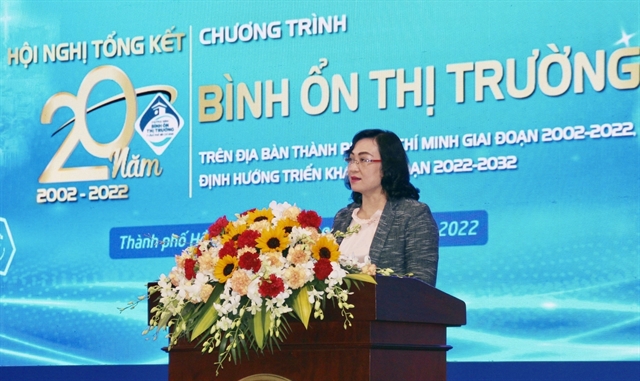HCM City’s market stabilisation programme will focus on further expanding the distribution system and enhance the efficiency of goods circulation in the coming years.

HCM City’s market stabilisation programme will focus on further expanding the distribution system and enhance the efficiency of goods circulation in the coming years, the Deputy Minister of Industry and Trade Phan Thi Thang has said.
Thang, until recently a city deputy chairwoman, said in the short term the programme needs to develop e-commerce infrastructure, particularly in industrial parks, export processing zones and outlying districts, which are filled with low-income people.
Enterprises need to embrace e-commerce to enhance the effectiveness of the programme, she told a conference held on Thursday to review the 20-year-old programme.
The industry and trade sectors need to adopt digitisation and advanced technologies and integrate into the global supply chain and economy, she added.
Nguyen Anh Duc, general director of Saigon Co.op, said it is essential to create a proper legal framework in line with the country’s local and international commitments in the context of greater global integration.
Market management also needs to be strengthened to prevent trade fraud and ensure the quality and origin of goods, he said.
Phan Van Mai, chairman of the city People’s Committee, said the market stabilisation programme has been a big help in ensuring social security in the city for the past 20 years.
Consumer prices have been kept steady and at a level usually lower than the country’s consumer price index, he said.
The city would continue to co-ordinate with other localities to develop specialised cultivation areas that meet food safety, production and distribution standards, he said.
When launched in 2002, the programme sought to prevent an inflation in the prices of food and foodstuffs during Tet (the Lunar New Year), by far the country’s largest festival when demand for them and other essential goods surge and, along with it, prices.
In 2010, the programme was expanded to include three other products and throughout the year: dairy products, essential drugs and school supplies.
Supply for the programme is usually abundant and at prices 5-10 per cent lower than market rates.
Now there are more than 10,900 points of sale around the city that supply goods at steady prices throughout the year. — VNS





